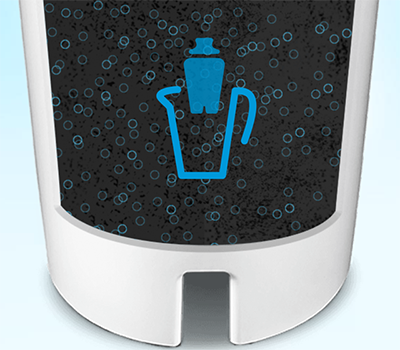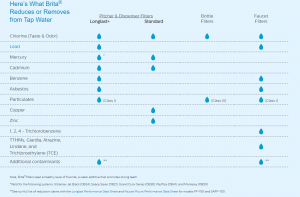Aller au contenu
Filtration Explained
How Do Brita Filters Work?
You already know that Brita transforms what’s in your  tap into great-tasting drinking water, but we thought you’d like some insight into how it all happens. Here’s how our different filter systems work to reduce common impurities in your drinking water.
tap into great-tasting drinking water, but we thought you’d like some insight into how it all happens. Here’s how our different filter systems work to reduce common impurities in your drinking water.
Brita Standard Filters
The white Standard Filters for Brita® Pitchers and Dispensers incorporate multiple processes to filter water. First, water flows through a built-in mesh screen that prevents black flecks. Secondly, activated carbon granules act like a sponge to reduce mercury and chlorine taste and odor. Also, Ion Exchange Resin captures copper, zinc and cadmium.*
Longlast+ Filters
Our Longlast+ Filters fit in all Brita® Dispensers and Brita® Pitchers. These longer-lasting blue filters feature a patented pleated media and proprietary active filtering agents to reduce the contaminants lead, asbestos, and cadmium for up to 120 gallons/454 litres.†
Bottle Filters
Our Bottle Filters are designed exclusively for use in Brita® Bottles to filter water as you drink. They utilize a carbon block form to reduce chlorine taste and odor and particulates† as water passes through for better-tasting water on the go.
Faucet Filters
Our Brita® Faucet Filters use the pressure in your tap to force water through nonwoven material and a tightly boundcarbon block. As water passes through the filter, the nonwoven element reduces sediment, while the carbon block traps smaller contaminants*. Brita® faucet filters reduce lead, chlorine, asbestos, benzene, particulates and other contaminants. See this chart for a complete list of what Brita reduces or removes from tap water.
Be sure to keep your filters in peak form
Keep in mind that Brita® filters work by trapping and holding contaminants*, so it’s important to replace them regularly to maintain optimum performance. Below is a quick guide for timing your Brita® filter changes. We recommend that users with hard water replace more frequently.


 tap into great-tasting drinking water, but we thought you’d like some insight into how it all happens. Here’s how our different filter systems work to reduce common impurities in your drinking water.
tap into great-tasting drinking water, but we thought you’d like some insight into how it all happens. Here’s how our different filter systems work to reduce common impurities in your drinking water.

